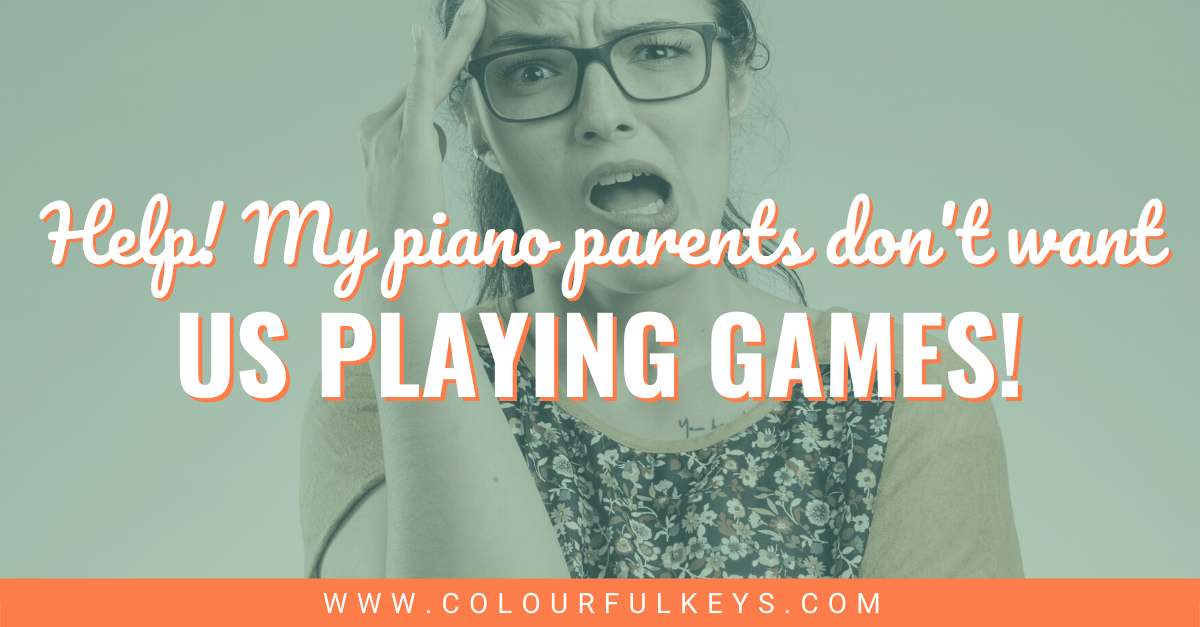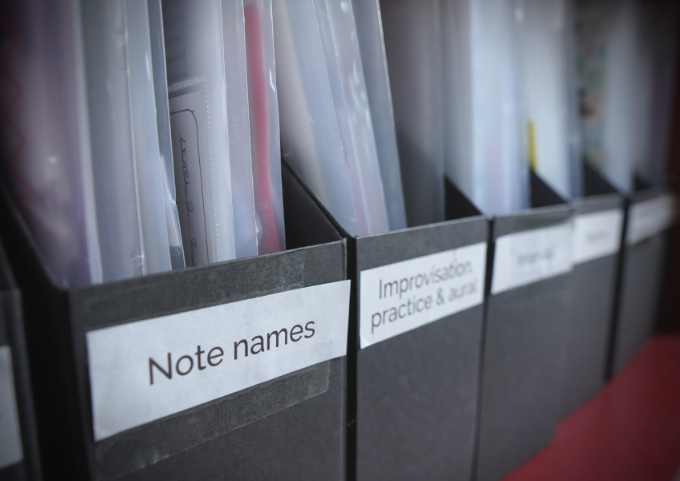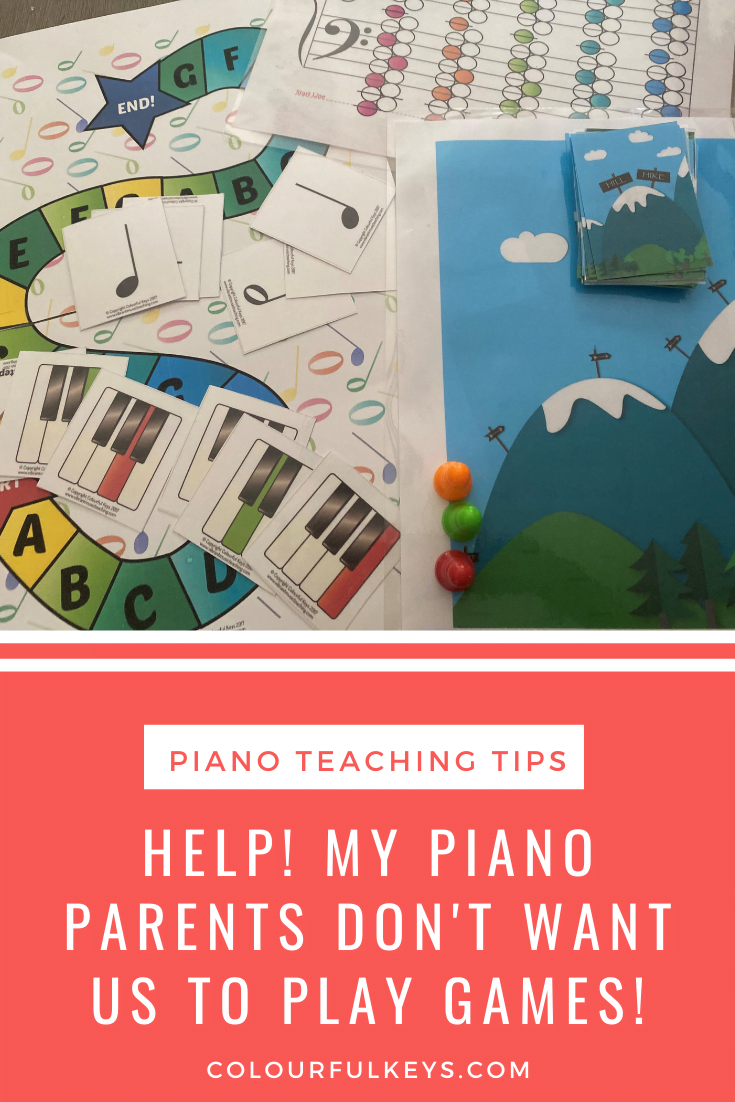Have you ever had piano parents complain that you’re playing too many games in lessons? Maybe they’ve asked you to take out all the games and just spend the whole lesson time on the bench? Party poopers!

⬆️ Listen to the podcast above or keep on reading, whichever fits your style. ↙️
Seriously, though, this is one of those times when we need to put on our best piano parent shoes. They don’t know what we know.
You might’ve been using games to teach for so long that the benefits seem obvious to you. But it’s not “common sense”; it’s learned knowledge.
The piano parent who seems to be questioning your teaching methods is simply worried…worried their kiddo won’t take music seriously. Worried that their child isn’t learning enough.
Or worried that they’re wasting their money.
If that last one makes you cringe, that’s your romanticised starving-artist brain talking. It’s perfectly valid for the parent to want to get what they pay for.
Have the Hard Conversation
Even if the piano parents in question take an accusatory or negative tone when they complain about games, they’re starting a conversation. Let’s find a way to have that hard conversation and make it productive.
Here are 3 games-based learning benefits you can explain to your game-doubting parent.
More Movement = Better Concentration
Children are not meant to sit still for prolonged periods. (Nor are adults, really. That’s why standing desks have been growing in popularity lately!)
Playing piano involves sitting relatively still with your eyes focussed either on written music or the keys. If nothing else, games provide a break for the eyes and the body by getting us up and looking around the room.
It is necessary to allow for good concentration, even in a short 30-minute lesson.
More Fun = More Learning
When we’re having fun, we’re fully awake and engaged. This means that we’re paying more attention and absorbing more knowledge.
Games have a magic ingredient beyond just fun, though. When students play games to learn concepts, they often get to discover the answer. Instead of being told they find it out for themselves and this make the learning much stickier.
Different Perspectives = Better Retention
Even if games were not such a wonderful place for learning, there would be benefits in them simply because they are different.
When we learn things through multiple different media, the understanding is more flexible and better retained.

A student who plays a game about intervals, marks them in their books, sings them and discusses them with their teacher is so much more likely to understand them than a student who is told about them 4 times.
Seeing is Believing
As well as talking this through with the concerned parent, make sure they have a chance to see the benefits in action.
Family Involvement
Try inviting the parent and/or siblings of the student into the last 5-10 minutes of a lesson to play a game together. The student can teach the parent how the game works and any music concepts or terms they need to play.
Through this, the parent will see:
- How much they personally learn through the game (if they don’t already know these music concepts)
- How engaged their child is in the learning and how much fun they’re having
Do this a few times, and they should be ready for the next step.
Games for Homework
While we’ve been talking about the benefits of doing games in lessons and parents thinking you’re spending too much time on them, you may have been muttering that you don’t have enough time for games!
This is where you can feed two birds with one pack of seeds.
Once the parent is a bit more on board and feels comfortable playing these games, you can swap out the theory worksheets in their assignment for a game instead. You save some lesson time and the parent gets to see the value day after day at home.
That’s a win-win if I ever saw one. 🤩
(By the way, if you need more help working with your piano parents, there are several helpful articles in the “parents” section of the Business hub.)
You’re the Teacher
Let me be very clear: This message is for your own inner dialogue. Do not go to a piano parent and say, “I’m the teacher and what I say goes. Because I said so.”
If you get a lot of questions about your use of games or accusations about wasting time, you’re probably making one of the mistakes below. The hard conversation and evidence we went through above should only be necessary for a small minority of families.
If it’s more than that for you, check in with these common mistakes.
Mistake 1: Not Using Pedagogically-Sound Games
Not all games are created equally. If your studio families all think the games you do are a waste of time, we have to reckon with the fact that they might be.
All of our games at Vibrant Music Teaching are created with a specific learning goal in mind. I make sure that our games not only achieve that goal, but they do it with minimal amounts of wasted time understanding rules or format.
Yes, this means our games can be simple sometimes. Simple and effective.

If you’re using games which aren’t from Vibrant Music Teaching, take a moment to ask yourself these questions:
- What does the student learn from this game?
- Are there lots of game elements and features which are not working towards that aim?
- Is this game age-appropriate and easy for them to understand?
I’m definitely not saying there aren’t great games outside of Vibrant Music Teaching! Just that if you’re getting them free from random blogs and sites, you need to be the filter they go through before they reach your students.
Mistake 2: Not Believing in Games-based Learning
What? Aren’t these teachers just not playing games at all??
Nope. I’ve met many teachers who think of games as a reward or brain break in lessons. They don’t plan for them to reinforce or introduce concepts…and so, even the best games won’t.
If you truly believe in games-based learning, then you will plan your games in the same way as you plan which pieces or scales to work on.
Games are not checking-out time.
If you believe in the power of games for teaching and you plan for it, you should have an easier time with that hard conversation. You’ll be able to stand your ground because you have made the decision to include them thoughtfully.
Mistake 3: Not Attracting the Right Piano Families
No, we’re not about to be elitist snobs. Quite the opposite in some ways.
There is a reason I’ve never had this conversation in the Colourful Keys Piano Studio. It’s not because everyone in my area intrinsically understands the benefits and value of using games to teach piano.
It’s because my website makes my teaching style clear.
And I talk about the way we do things with every new piano family.
You’re not the right teacher for everyone. If you’re anything like me, the family who wants a serious competitive music environment is just not a good fit for your studio.
I don’t even need to turn these families away. They come to my website, see all the colour and gamification, and leave.
I hear you. You’re saying, “But, but, nooo! All those potential students!!!”
But they are not the right students. It’s difficult to see this in the beginning when you’re trying to fill your studio, but we don’t actually need very many students.
Most single-teacher studios need just 20-30 students to feel full. It’s not worth filling your studio quickly with people that are just not a good fit and won’t stick around.
Make it clear in your marketing how you teach and the right students will come your way.
Your One Thing of the Week.
In every podcast episode and article, I give you one action item to take so the ideas and knowledge don’t stay stewing in your brain and clogging things up.
This time, your homework is to write down 3 more reasons why you use games in your studio.
Put these on a post-it and stick it on your fridge so you remember what to say next time a parent asks.
Have you ever had piano parents complain about your use of games?
What did you say? I’d love to hear your experiences in the comments below. 🙂

I have a talk right at the beginning and show them the games we will use for some of the concepts. Then I show them a 1B book and explain that “they get there”, even though we have fun getting there! It’s not the way we learned piano, for sure, most parents see the benefit of not having to force their kids to come to piano lessons!